Vegetarian Thai Drunken Noodles

If you're craving spicy Thai noodles but are short on time, Vegetarian Thai Drunken Noodles are your answer. In less than half an hour you will be able to tuck into a bowl of delicious rice noodles that packs in all the sweet, salty and spicy flavours you desire.
- Tofu - use unsmoked firm or extra firm tofu. Soft tofu is not suitable for this dish.
- Sauce - light soy sauce, dark soy sauce, oyster sauce or vegan mushroom oyster sauce and honey are combined to form the deliciously sweet and salty drunken noodle sauce. Dark soy sauce adds additional richness but can be substituted with the same volume of light soy sauce if you do not have it. Do not substitute light soy sauce with dark soy sauce, it will make the flavour of the sauce overpowering.
- Noodles - traditionally this dish is made with wide rice noodles. These can be tricky to get hold of in normal supermarkets but can be substituted with standard thin rice noodles or another variety of stir-fry noodles. Make sure you read the cooking instructions on the packet as these may vary depending on the type of noodles you decide to use.
- Chilli - Bird's eye chillies add heat as well as a fruity freshness. You can substitute one bird's eye chilli for two long red chillies. If you are sensitive to spice reduce the amount of bird's eye chilli or use long red chillies instead.
- Veggies - this recipe uses a red or green pepper and courgette/zucchini. You can substitute these for another type of vegetable that is appropriate for stir-frying such as pak choi, broccoli or green beans.
- Thai basil - this is one of the main players in Thai drunken noodles. It has a very different flavour from regular basil and a much bolder and spicier taste. The number of grocery stores stocking Thai Basil seems to have increased over the last couple of years. I used to have to purchase it from an Asian grocery store but now I can find it at my normal supermarket.
Make sure all the ingredients are prepped before you start cooking. Things will move very quickly once you begin. This is not a dish where you can prep-as-you-go.
Sauce - make the sauce by mixing together the soy sauce, dark soy sauce, oyster sauce and honey in a medium to large bowl.
Prep tofu - remove as much moisture as possible from the tofu by pressing it in between some kitchen towels and cut it into bite-size pieces. Toss the pieces in the bowl with the sauce until they are coated. Leave them for a few minutes while you prepare the noodles.
Noodles - prepare the noodles according to the packet instructions. If you are using wide rice noodles this will involve placing them in a bowl or a pan of hot water until they have softened but are still a little al dente. Remember that they will cook a little more when added to the wok or frying pan so it's best for them to be a tiny bit underdone.
2. Cook the tofu
Place a wok or frying pan on a high heat, pour in the oil and add the pieces of tofu when the oil is hot. Remove any excess sauce with some kitchen paper before you do this. Fry the tofu until it is crispy, turning halfway to ensure both sides of each piece are slightly brown and crisp. Remove the tofu from the pan and set aside when done.
3. Fry the veggies
Add the other half of the oil to the pan. Fry the onions, chilli and ginger for a few minutes until the onions are soft. Add the pepper and courgette/zucchini and fry on a high heat for a few minutes until tender. Reduce the heat to medium and add the garlic and fry for a further minute.
4. Noodles, tofu and sauce
Increase the heat to medium/high and add the cooked noodles. If the noodles have stuck together a little run them under some cold water to loosen them up first. Toss the noodles for a couple of minutes until they are hot. Reduce the heat to a low-level and add the sauce and the tofu. When the sauce is mixed thoroughly with the noodles and vegetables add the Thai basil and lime juice. Serve as soon as the basil is wilted.
- Wok/large frying pan - A wok is the best type of pan for drunken noodles and other stir-fry dishes. Its high sides enable you to quickly toss the ingredients together on a high heat. If you do not own a wok a large frying pan will do the job, but if you are a fan of stir-fries a wok is a great investment.
- Saucepan / large bowl - this is required for cooking the noodles. Wide rice noodles normally need to be soaked in hot water that has just boiled for a few minutes.
- Medium - large-sized bowl - the tofu pieces will be tossed in the sauce before they are cooked to add additional flavour. Make sure you use a bowl that is large enough to accommodate the tofu pieces as well.
- Colander - for draining the noodles.
- Tongs - these are optional but I find them very useful for serving the drunken noodles.
- Noodle bowls - these are also a nice-to-have. There is something really pleasurable and fitting about eating Asian noodle dishes in a large noodle bowl. I highly recommend purchasing some noodle bowls if you are a big fan of stir-fries and other Asian dishes. Of course, you can serve the noodles in another type of bowl or on dinner plates if you do not own noodle bowls.
- Prep all the ingredients before you start cooking - things move very quickly once you start cooking. This is the case with most stir-fry dishes and drunken noodles are no exception. Make sure you have all the ingredients ready before you start cooking as there is little time to prep as you go along.
- Do not overcook the noodles - make sure you remove the wide rice noodles from the hot water and drain them when they have started to soften but are still a tiny bit on the hard side. The noodles will cook a little more when you add them back to the pan or wok. If the noodles are overcooked they will lose their form and break into smaller pieces.
- Make sure the noodles do not stick together - run the colander containing the cooked noodles under the cold tap and shake out the excess moisture. If they are a little stuck together when you come to add them to the pan or wok run them under the cold tap again to loosen them up a bit.
You can store the leftovers in the fridge for up to 3 days in an airtight container. I sometimes find that the noodles are even more flavourful the next day so it's definitely a good shout to make some extra and enjoy the leftovers for lunch or another speedy dinner.
Can you freeze Thai drunken noodles?Yes, you can freeze them for up to 3 months. I rarely freeze this dish. It is so quick to make that I make it fresh each time, but it is a good option for those who wish to batch cook and have a yummy, speedy noodle meal in a jiffy.
How spicy are vegetarian Thai drunken noodles?Drunken noodles are the perfect dish for spice lovers because the bird's eye chillies pack a definite punch. If you are sensitive to spice you can either reduce the amount of birds eye chillies, use standard long red chillies instead or omit the chilli altogether.
- Sweet Potato and Tofu Thai Red Curry
- Vegan Sweet Potato Chilli Recipe
- Sage Butter & Walnut Pasta
Vegetarian Thai Drunken Noodles
Recipe details
Ingredients
Sauce:
- 3 tbsp light soy sauce
- 0.5 tbsp dark soy sauce
- 3 tbsp honey
- 3 tbsp oyster sauce or vegan mushroom oyster sauce
Drunken noodles:
- 280g (or 10oz) firm tofu
- 200g (or 7oz) wide rice noodles
- 2 tbsp groundnut or vegetable oil
- ½ onion - finely chopped
- 2 birds eye chillies - finely chopped
- 2 tsp ginger - finely chopped
- 1 red or green pepper - cut into thin strips
- ½ courgette/zucchini - halved vertically and thinly sliced
- 3 cloves of garlic crushed
- 2 spring onions / scallions - finely chopped (optional)
- 12g (or ½ cup) Thai basil leaves - washed and stems removed
- ½ lime juice
Instructions
- Make sure all ingredients are prepped before you start cooking. (note 1)
- Prepare the sauce by mixing the sauce the ingredients in a medium-large bowl.
- Prepare the tofu: Use kitchen paper to remove as much excess moisture as possible from the tofu and cut it into bite-size pieces.
- Placed the pieces of tofu into the sauce mixture for a few minutes while you prepare the noodles.
- Cook the noodles according to the packet instructions. This normally involves soaking them in a pan or bowl of hot water for a few minutes until they start to soften but are still quite firm.
- Remove the tofu pieces from the sauce mixture, place them in a bowl and remove any excess sauce with kitchen paper.
- Fry the tofu: Place your wok or frying pan on a high heat, pour in half of the oil and add the tofu pieces when the oil is hot and fry for a few minutes until crisp. Turn halfway to ensure both sides are cooked.
- Place the wok or frying pan on a high heat and add half of the oil. Add the onions, chilli and ginger when the oil is hot and fry for a few minutes until the onions are soft and translucent.
- Add the red/green pepper and courgette/zucchini and continue to cook on a high heat until tender.
- Reduce the heat to medium and add the garlic and spring onions (or scallions) and cook for one minute.
- Increase the heat to medium-high and add the noodles to the pan. If you find they are stuck together rinse them with a little cold water first.
- Toss the noodles in the pan for 1-2 minutes until they are hot.
- Reduce the heat to low and pour on the sauce. (note 2)
- Stir in the Thai basil leaves and lime juice, and return the cooked tofu to the pan.
- Serve as soon as the Thai basil leaves have wilted.
Tips
- It will all happen very quickly once you start cooking and there will not be time to cut vegetables and prep ingredients during the process.
- It is important to reduce the heat of the pan to its lowest or to take it off the heat altogether to ensure that the sauce does not evaporate. The pan should be very hot from cooking the vegetables and the basil should wilt easily.




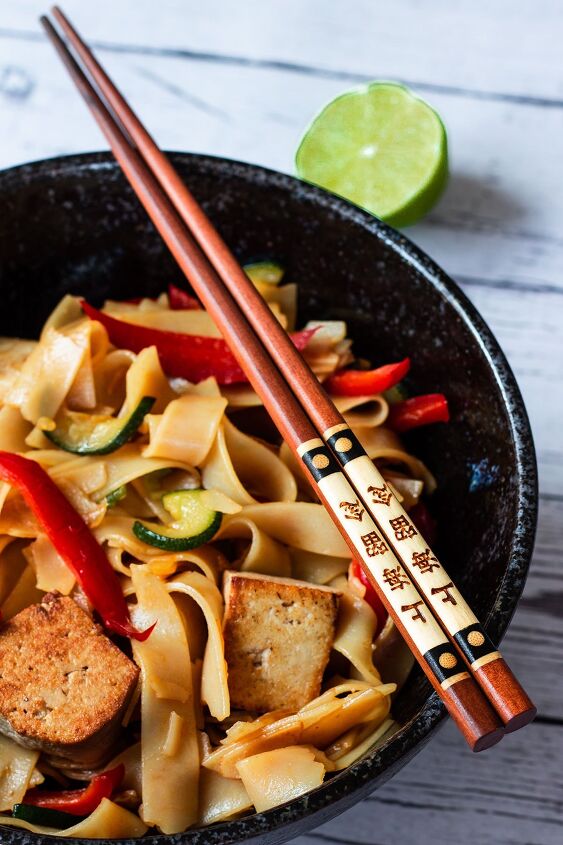







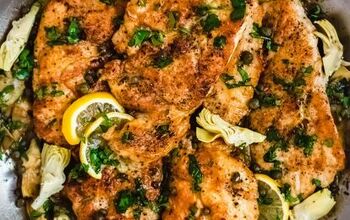



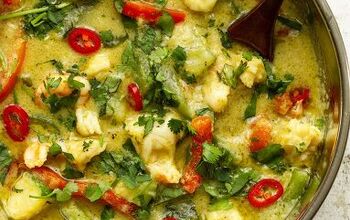
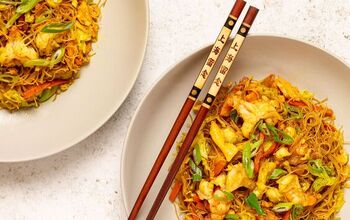


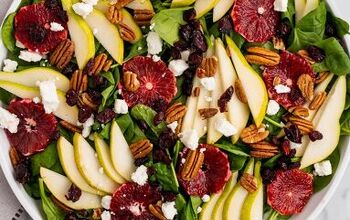
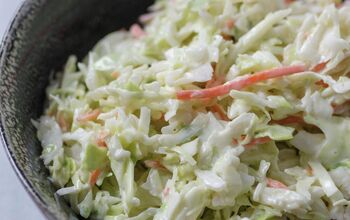




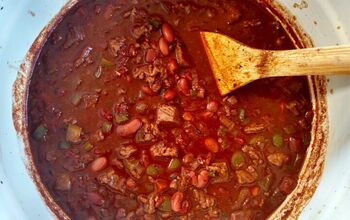

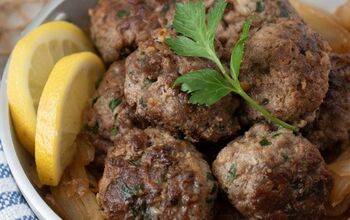

Comments
Share your thoughts, or ask a question!